#man i wish they got to run away and give themselves new names jfc
Explore tagged Tumblr posts
Text
listening to brand new colony by the postal service and thinking about Ava and Lizzie on this fine evening.
#if I could animate it’d be this song#I’d animate the two to this song for SURE#“I’ll be the water wings that save you if you start drowning in an open tab when your judgements on the brink”#alcoholic is like Lizzie’s middle name#the whole last verse ????#man i wish they got to run away and give themselves new names jfc#maybe I’m just a sucker for the couple that runs away together#“everything will change” oh boy#jrwi waning crescent#jrwi Lizzie#jrwi ava#Ava ferin#Lizzie Lafayette#jrwi#just roll with it#jrwi riptide#jrwi spoilers#JRWI riptide spoilers#JRWI riptide 101 spoilers#there’s technically only vague spoilers in this post but they count#the postal service#brand new colony
1 note
·
View note
Text
Mairimashita! Iruma-kun s2 ep17
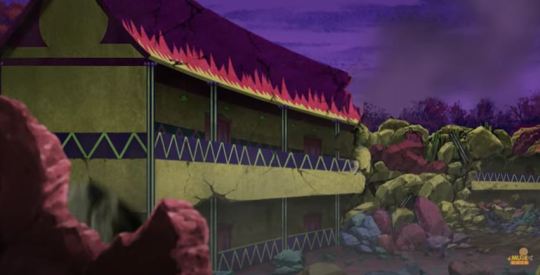
So many things happened in this episode...
Very long post warning!
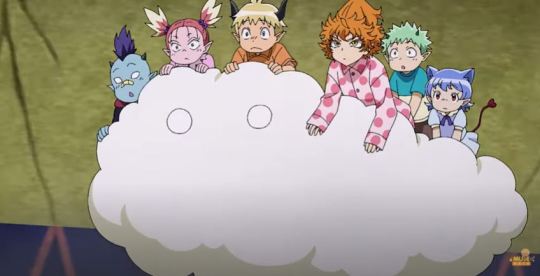
Iruma, Baram-sensei, and Agares are on their way to evacuate the kids.
Listen, it might just be me but while I appreciate that Agares has not put back on his eye mask after it was taken off the first time, I really wish he’d get a different hairstyle. I mean, his face already looks good but his hair, man.
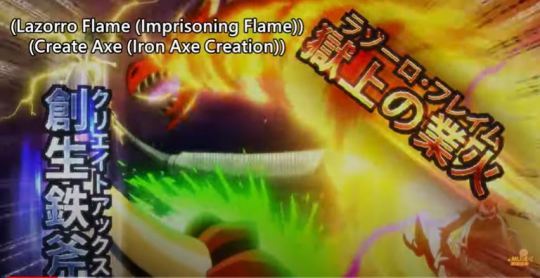
Sabnock and Azz were only told to get the dragon's attention while the kids are being taken to safety. They were explicitly told not to get too close and actually fight the dragon. What do they do? They do exactly the opposite of that. The two makes it a little competition as to who is better/stronger and argues while in battle.
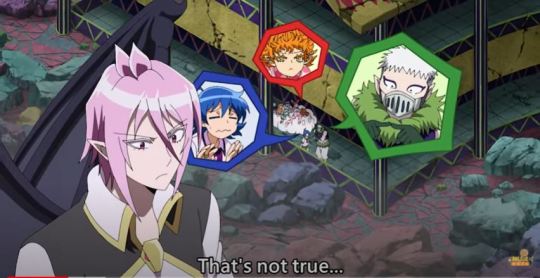
Sensei is sad that the kids didn't listen to him and feels that it might be cause he wasn't good enough as a teacher. Iruma tries to tell him that it's not true.
Don’t worry, Sensei! It just so happens that this is the Abnormal Class students and this is just how they are. You might have better chances with the others.
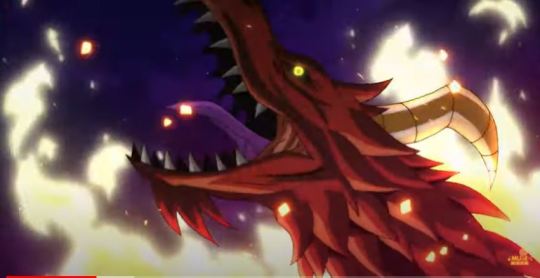
Azz and Sabnock continue to fight the dragon but their arguing also meant they don't mind accidentally (or not) hitting each other with the attacks.
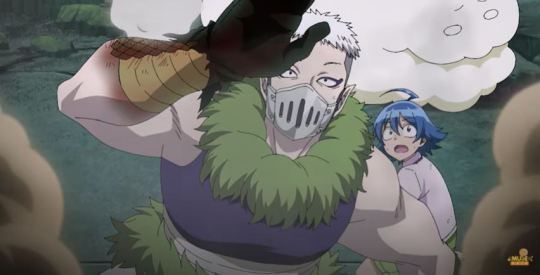
While the two were busy arguing, the dragon sees Iruma's group and sends a beam their way but Baram-sensei manages to protect the group. And yeah, the little kids are safe inside Agares’ floating cloud thing.
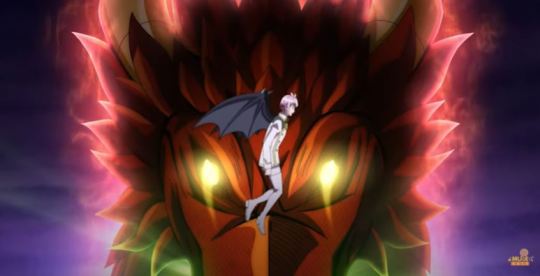
Azz was worried about Iruma and the others that he doesn't notice the dragon behind him about to attack. Iruma tried to yell out a warning but it was too late.
Look, I know he’s not gonna die and all. He’s one of the main characters and they have plot armor but seeing the look on everyone else’s faces as they watch this happening before their eyes is still terrible.

As Iruma helplessly watches one of his bestfriends get blasted, he remembers what Kalego-sensei told him about being reckless enough to get in danger. Iruma knew it happens a lot but he didn't really mind and thinks everything will be okay in the end but that's because he only thought of what could happen to him. He now realizes that now that he has friends and loved ones, getting himself in danger meant that they, too would get in danger.
It’s awful to think about in many ways really. Iruma didn’t have friends prior to coming to this world and his family sucked. He had to take care of himself and himself alone and he’s so used to it that being in danger or in trouble is not really that big of a deal cause he’s used to it. The consequences also fall on just himself. Now though, he has a loving family and a group of friends and he’s no longer alone not just in happy times but also in times when things could go wrong.

Of course, Azz isn't blasted to bits. Sabnock protected Azz by making a shield but it melted and he himself got hit pretty badly with his wings being a casualty.
This actually hurts to look at. He’d be okay, right? His wings are gonna heal, right?

Azz: "Why did you save me?"
Sabnock: "Cause it's cool!"
Sabnock did what he did cause he wanted to look cool because the demon king is supposed to be cool. jfc this boy!

The dragon attacks them with fire this time but they were able to avoid it and hide. Sabnock suggest that they retreat for now cause they could die if they don't.

Azz is against it so Sabnock explains to him that if his ambition is to win just this fight then he could do so and die if he wishes. But Sabnock knew Azz has an actual dream (of being Iruma's best ally and all) and if Azz wants to attain that one day he needs to think properly. Sabnock tells him that he's had to learn the same lesson (back in season 1) and now Azz has to as well in order to grow.
He basically sort of says the same thing Kalego-sensei thought when he made that home visit to Azz’s house. Asmodeus is too obsessed with Iruma and neglects himself because he kept putting Iruma first but if he grows and becomes better, then he’d be a better ally to Iruma.
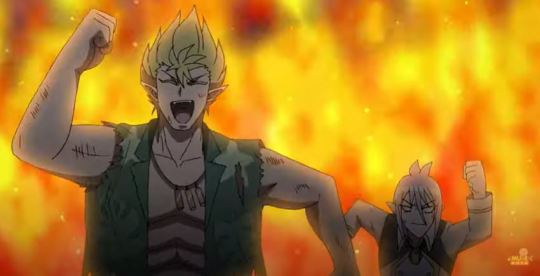
Azz uses the last of his magic to create a flame wall for them to escape. He then admits that he was wrong and that Sabnock was right.
The two tries to run to safety as they can't fly due to injury and lack of magic. Azz thanks Sabnock for saving him and Sabnock tells him that at that moment, both of them are extremely cool. I agree, you’re both cool.

Sensei saves them from another light beam! He tells the two to go and to leave this to him.

When they finally got back, Iruma immediately hugs Azz and cries in relief that his friend isn't dead. Aww... Azz didn’t see this coming and also felt sad when he sees Iruma crying.
Iruma apologizes for not thinking about things and that his decision got them in danger while Azz says it was also his fault for being reckless so Iruma shouldn't apologize. Sabnock got annoyed and decided to carry them off and away from the nearby fight.

Back to the fight, Sensei had already summoned his own dragon. Sensei uses his knowledge about different creatures to attack the Carmine Dragon.
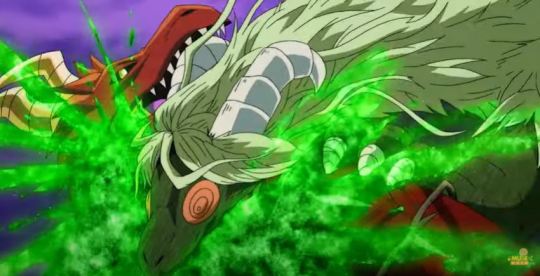
The Wood Dragon infused with Sensei's magic is strong even against the opponent’s flames. He's gonna give it his all because the beast had hurt his precious students. I think that’s really sweet as despite the bad impression everyone’s got of him, he really does love his job and the kids he teaches.
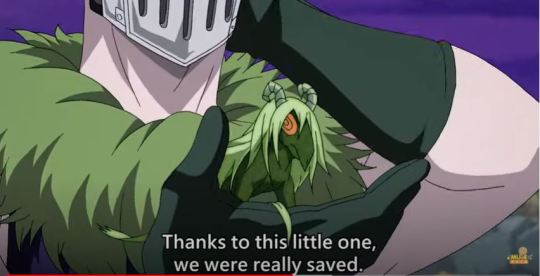
After beating the Carmine Dragon, Sensei gets back to the others. The Wood Dragon is back to it's normal form and it's so tiny and cute. Seeing Sensei's strength, Azz and Sabnock asks Sensei to teach them magic. This kind of confuses Sensei because normally, people try to escape his studies and not ask to be taught by him. They’re finally seeing him in a good light.
I remember when Baram-sensei was first introduced, it was Azz that was warning Iruma about the strange teacher and how they probably shouldn’t take his class. Now, it’s Azz who was first to ask Baram-sensei to teach him.

Two of the defeatd beasts turn into beams of light and goes towards the dragon and all three fused into this bigger creature. And since they fused with the dragon, it means they're right where Team Baram is.
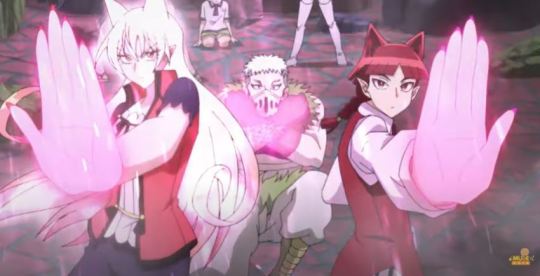
Look who came! Opera and Ameri arrived in the nick of time to help Sensei protect everyone. Baram-sensei asks for his Opera-senpai's help to fight.

Opera says it'll be too much for just the two of them and whips out the "secret weapon". lol was this what Opera asked from Clara?
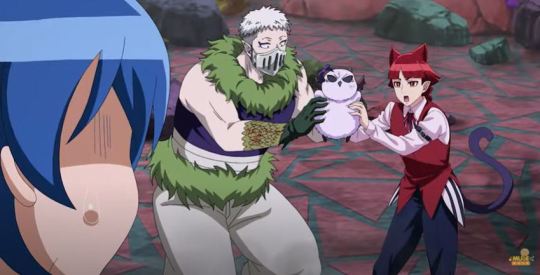
The kids of Team Kalego asks if Kalego-sensei isn't gonna do something about the beasts who glowed and shot off somewhere. Kalego-sensei tells them he already did had his fun and that's all he'd do. He then gets summon and we now have Fluffy-sensei!
The two other adults are very happy to hold the floof and I cannot blame them I wanna hug that floofy-sensei, too. Kalego-sensei asks Iruma to release the summon so he could go back to normal but Opera tells them Kalego-sensei would also be transported back if his summoning is released.
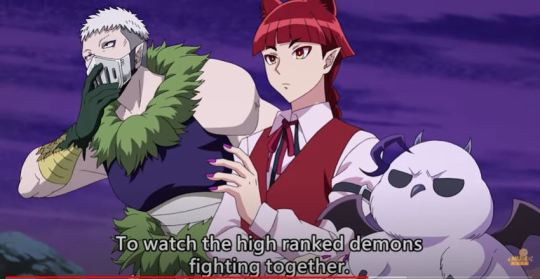
This shot would've been so much more badass if Kalego-sensei wasn't in his cute fluffy form. The students are excited to watch the powerful adults fight together.
As much as I like the whole “underdogs win the fight and impress everyone”, I appreciate how realistic this show is handling this. The magic beasts are super powerful and the majority of the main cast available are first years students who are still learning how to do their thing plus Iruma is a human using borrowed magic. Letting the adults, who are not only said to be some of the most powerful demons but are also experienced, handle the big fights is actually nice. Plus they’re also important characters and if the show is gonna try to convince us that these three are very powerful then they have to show it in the story which they are. It’s great!

The three quickly made individual attacks at the same time insta-killing not just the beast but also the excitement everyone had. There was no battle and this was totally one-sided.

The leader of the Six Fingers is made aware of what happened to their beasts but he isn't too worried cause the thing can self-destruct. The purpose of the three beasts was to destroy the park after all so even in death, they'd do just that. Agares creates a giant hole for them to hide in but while in their little safe zone, Ameri gets a horrifying realization that the blast would certainly hit the evacuation shelter. Attacking the beast would just make it explode faster and they have no other way to communicate to the people there to give a warning.

At the last moment, when all hope is lost, Ronove comes in, screaming at the monster cause the thing not just ruined Walter Park (which was built by his Legend-daddy) but also hurt the people there. Using his ability, he gets the monster's attention (and also everyone else's. There are news crews there if you remember correctly and sp cameras). Poor Ronove realized too late that he'd get hit instead because of what he did and had no plan whatsoever of what to do after.
lol what is Legend-daddy in Japanese? I think it’s a cute name to call your parents. What does he call his mom? Will they every show it in the anime? Anyways, I think this is pretty cool of Ronove to do. He’s kinda arrogant but he’s not a bad person.
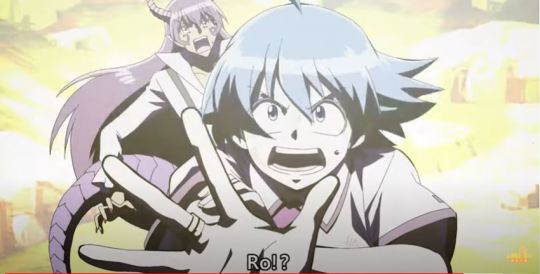
Iruma comes in to try to defend Ronove. What happens next? We'll find out next episode.
--
Tumblr let me have the miracle of not giving another error when posting more than 15 images! There’s like, 25+ here! The episode didn’t feel rushed even though so many things happened and it’s awesome!
First of all, I like Sabnock’s character. Back at the beginning of season 1 I thought Asmodeus was gonna be Iruma’s rival but that was quickly dashed when he becomes a very close ally and follower instead. Then Sabnock came along to take the rival role. Unlike other rivals who can be annoying or too full of themselves or at worse, bordering villain status if they aren’t one already, Sabnock is actually a nice guy and a friend to Iruma. He learns from his mistakes and desires to improve on them. He wants to be a Demon King and he’d work hard on it and if he feels he’s lacking something, he’d try to so something about it. When Iruma does something better than he could, he gives genuine praise and doesn’t get mad that someone else did better. He’s a pretty cool guy and while we all know Iruma would end up becoming the Demon King anyways, I think Sabnock would also be perfect for the role as well.
They let Ronove do something cool this time! He didn’t think things through but his heart is in the right place and that’s what matters. He’d be fine! Haha
Opera and Baram-sensei both happy when holding the floofy Kalego-sensei is funny. I wonder how they reacted the first time they saw it?
Next episode they’d probably be on the road to facing the Six Fingers and Kiriwo-senpai since the issue with the beasts is gonna be dealt with at the start of it. I’m kinda excited to see how it’ll all go.
Thanks for reading! I hope that wasn’t too boring. There were so many screenshots this time around.
11 notes
·
View notes
Text
Here it is… my masterpiece of procrastination… the long-awaited sequel to The Quraysh Were Good Actually: 2 Ghazwa 2 Furious, per anon’s request. I actually couldn’t get it all in one post anon, sorry, bc it’s goddamn 10,000 words long jfc but I got it into two, which is much better than the five I had @quranreadalong!!!
This is all about military expeditions in Mohammed’s time. It sounds dry but I promise it’s fire. Jews getting massacred! Temples getting burned down!! Swarms of bees sent to punish the disbelievers!!! Extreme feudalism!!!! All this and more during the spread of The True Religion. I took mercy upon all y’all app users by not putting the whole thing as one post and making u scroll 5 minutes to get to the end of it.
This is an almost-complete rundown of military expeditions in Mohammed’s era, starting in Medina (622 AD) and leading up to the expedition to Tabouk (630 AD). It all started with our dudes the Quraysh in Mecca and their allies.
Mohammed’s followers had been raiding trade caravans headed to and from Mecca for a while. The first attempted attack on a caravan was only a few months after Mohammed moved to Medina with his followers, and more raids were carried out once every couple months after that. The motive was simply to get whatever the caravan was carrying. The early historian Ibn Ishaq quotes Mohammed as sending his men out with the command:
Go forth against this caravan; it may be that Allah will grant you plunder
Ambushes like this were pretty par for the course; there were always brigands laying in wait to attack caravans and steal their shit. So while this was annoying, it was not really unprecedented for a center of trade like Mecca, and the men traveling with each caravan were used to dealing with the situation and escaping from attempted raids. Mohammed’s people were simply one of many nuisances at this point, and their raids did not actually accomplish much until late 623 AD. This was the Nakhla raid.
Here’s the deal. In both the Islamic calendar and the polytheistic Arabian calendar that preceded it, there are four “sacred” months during which you’re not supposed to shed blood. One of those months is Rajab, the seventh month. Both Muslims and polytheists agreed that no one should be killed in this month, but Mohammed sent out a raiding party towards the end of the month anyway, headed by one of his idiot extended family members, Abdallah ibn Jahsh. Unbeknownst to anyone at the time, Abdallah had a penchant for Yeezys, and the Meccan caravan happened to be carrying some.
This expedition proceeded until they reached Nakhlah where they found ‘Amr ibn al-Hadrami leading a trade caravan for the Quraysh. That day was the last day of the sacred month. The Muslims were divided in their opinion. Some of them said: 'We know for certain that today belongs to the sacred month, we are of the view that you should not violate it because of greed’. The opinion of those who desired the stuff of this world gained the upper hand; they attacked Ibn al-Hadrami, killed him and seized his camels. Ibn al-Hadrami was the first person to be killed in a fight between the Muslims and the disbelievers. The disbelievers of the Quraysh heard about the incident and sent a delegation to the Prophet, Allah bless him and give him peace. They said to him: 'Do you allow fighting in the sacred month?’ As a response, Allah, exalted is He, revealed this verse (They question thee (O Muhammad) with regard to warfare in the sacred month…)
So even though it was a truce month and the raiders themselves knew it, they attacked the caravan, killed a trader, and stole the Yeezys anyway. The Quraysh were very upset and demanded answers from Mohammed, at which point “Allah” revealed that the raid was okay because the Quraysh were big meanies and disbelievers.
Now convinced that Mohammed’s followers were murderous lunatics, the Quraysh decided to prepare an army to send out to defend their next caravan if necessary. When Mohammed moved to attack a caravan returning from Syria to Mecca, the army set out to defend the caravan. The two armies met at a water source between Mecca and Medina called Badr, and that battle went well for the Muslims, with a few dozen Meccans dying and more being taken captive. (The caravan got past them, though.)
After Badr, many non-Muslims in Medina were furious at their new neighbors for instigating such a conflict. The Muslims were viewed by their non-Muslim neighbors not only as the aggressors, but also as a real threat to Medina’s relations with Mecca and their allied merchants in the area. One such person was a woman named Asma, a poet. In one of her poems she expressed rage at Mohammed and his people attacking the Meccans (many had friends or family in Mecca and the two cities were generally friendly with one another prior to Mohammed’s arrival) and wished for Mohammed’s death:
Do you expect good from him after the killing of your chiefs / Like a hungry man waiting for a cook’s broth? / Is there no man of pride who would attack him by surprise / And cut off the hopes of those who expect aught from him?
Mohammed was not happy upon hearing this. Ibn Ishaq’s biography continues:
When the apostle heard what she had said he said, “Who will rid me of Marwan’s daughter [Asma]?” Umayr b. Adiy al-Khatmi who was with him heard him, and that very night he went to her house and killed her. In the morning he came to the apostle and told him what he had done and he [Muhammad] said, “You have helped God and His apostle, O Umayr!” When he asked if he would have to bear any evil consequences the apostle said, “Two goats won’t butt their heads about her”, so Umayr went back to his people.
As far as I recall, Asma is the first recorded unarmed murder victim among the polytheists of Medina. She would not be the last Medinan poet to be killed that year; Mohammed also ordered the death of an old Jewish man for similar reasons that same year (and later ordered the death of another Jew who committed the same offense). The murder of those who dared speak against him was part a campaign of stamping out dissent and solidifying control of the area.
Mohammed believed that one community in particular stood in his way.
The first of three conflicts between Mohammed and the Jewish tribes of Medina began not long after Badr. As I’ve said before, Mohammed didn’t really interact with Jews en masse until his Medina days, and he seems to have been genuinely appalled that they not only didn’t believe he was a prophet, but believed that he was a bullshitter who distorted the Torah’s stories and their belief system. Relations between Muslims and Jews in Medina were not ideal for this reason, especially because the Jews were a prosperous and influential minority group that held power in the city, but from 622-624, there wasn’t really outright conflict. But the Jews’ persistent refusal to “embrace Islam” was noted and deeply resented.
That changed after Badr. Mohammed was feeling like a widow who just buried her third husband and was sick of having to deal with the Jews’ shit when he was basically running the place. Ibn Ishaq:
When God smote Quraysh at Badr, the apostle assembled the Jews in the market of the B. Qaynuqa’ (one of the three Jewish tribes, mostly smiths and jewelers) when he came to Medina and called on them to accept Islam before God should treat them as he had treated Quraysh.
And so he announced:
O assembly of Jews! Surrender to Allah (embrace Islam) and you will be safe!
Those who did not convert were told in no uncertain terms what Mohammed was preparing:
You should know that the earth belongs to Allah and His Apostle, and I want to expel you from this land.
From here on out, relations between Muslims and Jews were quite understandably tense. He saw the Jews as an obstacle to full control of the city and he wanted them gone from Medina. And before long, he would accomplish that goal.
The first of the three tribes to displease him was the Banu Qaynuqa. Neither Ibn Ishaq nor al-Tabari (nor any sahih source) gives the specific trigger for this incident, though more... colorful historians did invent an excuse it that is genuinely laughable. According to these accounts, the incident that prompted their eventual doom involved a jeweler belonging to the clan interacting with a Muslim woman and taking off her veil by pinning it down to a counter without her noticing (other histories say he “stripped her naked”–quite a strong pin!). A Muslim man observed this and beat the jeweler to death, prompting nearby Jews to try to pull him off the guy and subsequently kill him, and so on.
Whatever happened, Mohammed made good on his earlier threat to the Jews.
He sent his men to besiege the Banu Qaynuqa in their quarters for two weeks. It was evidently a bloodless siege as the Banu Qaynuqa do not seem to have fought back, and were perhaps unable to do so. They offered an unconditional surrender. The question then was what to do with them. One of the leaders of Medina forcefully pleaded for their lives. Al-Tabari:
Abd Allah b. Ubbay b. Salul rose up when God had put them in his power, and said, “Muhammad, treat my mawali [friends of tribe] well”; for they were the confederates of al-Khazraj [Abdallah’s tribe]. The Prophet delayed his answer, so ‘Abd Allah repeated, “Muhammad, treat my mawali well.” The Prophet turned away from him, and he put his hand into (The Messenger’s) collar. The Messenger of God said, “Let me go!” – he was so angry that they could see shadows in his face (that is, his face coloured). Then he said, “Damn you, let me go!” [Abdallah] replied, “No, by God, I will not let you go until you treat my mawali well. Four hundred man without armour and three hundred with coats of mail, who defended me from the Arab and non-Arab alike, and you would mow them in a single morning? By God, I do not feel safe and am afraid of what the future may have in store.” So the Messenger of God said, “They are yours.“
(This is the same guy labeled one of the munafiqun/fake Muslims in the Quran; there is no doubt that his kindness to the Jews of Medina was part of the reason for the suspicion towards him.)
The Jews of the Banu Qaynuqa were all kicked out, male and female alike, except for those few who wanted to stay and “converted” to Islam. The rest made their miserable way north. Mohammed confiscated their property and divided it among his followers and family members according to “Allah’s rules”. By pure coincidence, the Banu Qaynuqa had been prosperous smiths and jewelers who operated Medina’s market. Which was now up for grabs. Hrm...
That took care of the first Jewish tribe. They were the lucky ones.
The first recorded Medinan Muslim deaths outside of combat occurred about a month after this. Two farmers, at least one of whom was Muslim, were killed when a group of Meccan soldiers, seeking to avenge their comrades at Badr, torched a field a few miles away from Medina, where the two people were killed. This was, of course, the fault of The Jewz. Ibn Saad’s sira states:
They knocked at the door of Huyayy ibn Akhtab to gather information about the Apostle of Allah and his companions. He refused to open the door. They knocked at the door of Sallam Ibn Mishkam who opened the door, feasted them, offered them drink and supplied information about the Apostle of Allah.
Huyayy was the leader of the Banu Nadir tribe of Medinan Jews. Sallam here was a rabbi who deeply disliked Mohammed and thought he was a charlatan and, after his Badr and caravan expeditions, a dangerous cult leader. He exposed Mohammed’s lack of Biblical knowledge on multiple occasions, and Mohammed loathed him in return. We have absolutely no idea if Sallam’s involvement here is true or not due to the weak chain of transmission. It seems rather unlikely; the Meccans seem to have just been intent on quickly causing trouble and then leaving rather than staying to plan any larger attack or gathering information. When Mohammed decided to turn his wrath on the Banu Nadir, this supposed incident would not be the trigger, or even mentioned as an excuse.
Meanwhile, Mohammed can’t stop, won’t stop the raiding business. But his raids this time didn’t accomplish much–the Muslims captured some pack animals and goods at best, and walked away empty-handed at worst. Ibn Ishaq blandly lists the raids that occurred in 624 AD following Badr (no motivations are given for any of them). One involved Mohammed’s fighters trying to find some men of the Banu Sulaym tribe to raid, but they couldn’t locate them. There was another raid on the Quraysh, though this one doesn’t seem to have worked. Finally, we’re told that “he raided Najd, making for Ghatafan” shortly after the burnt-field incident mentioned above. Najd is the region to the east of the Hijaz, and the Ghatafan tribe was a large confederation of mostly-Bedouin clans that lived there. We will be seeing them again later, and we will discover that they didn’t enjoy Mohammed’s antics much.
Ibn Saad’s sira adds some color to this last raid, and gives some details to flesh out the story: two Ghatafan clans, we are told, were amassing themselves… in the middle of the Najd… to attack Medina. Of course. (Ibn Saad’s sira does this over and over again, it’s kind of funny. He probably got this tendency from his inventive teacher, al-Waqidi.) Mysteriously, when Mohammed’s army approached this spot, the evildoers… fled in terror and didn’t even try to engage them! The Muslims were able to capture a guy, who told them:
They will never confront you. If they learn of your march they will flee to the peaks of the mountains.
Some sources say that this poor dude was then put to death, or, as one book nicely puts it, “met his fate ordained from pre-eternity”.
So much for that whole threatening-Medina thing.
Finally, there was another caravan raid in this time period, also in the Najd region. Ibn Ishaq states:
The Quraysh were afraid to follow their usual route to Syria after what had happened at Badr, so they went by the Iraq route. Some of their merchants went out, among whom was Abu Sufyan, carrying a great deal of silver which formed the larger part of their merchandise. … The Apostle duly sent Zayd, and he met them by that watering place and captured the caravan and its contents, but the men got away. He brought the spoil to the Apostle.
The evil Meccans specifically took a different route to avoid the Muslims, but the Muslims wanted that sweet, sweet cash and attacked the caravan anyway. They took a shitload of silver straight to Mohammed.
It is at this point that the Meccans said “you know what? fuck this shit”, prompting the Battle of Uhud, which is a mountain near Medina. Uhud did not go very well for the Muslim army; Mohammed’s troops were poorly disciplined and left themselves open to cavalry attacks from the Quraysh. About as many Muslims died at Uhud as Meccans had died at Badr. So the Quraysh went back to Mecca, feeling confident that they’d taught Mohammed a lesson, rather than pursue his people into Medina.
Mohammed’s pride was badly wounded by the whole incident, and he needed to raise his army’s morale. So the day immediately following the battle, he ordered his some of his men to chase down the Meccans as they were headed home. The two armies seem to have tried to play psychological games with one another without actually engaging each other, but nothing came of it--the Quraysh made their way back to Mecca and Mohammed’s men went back to Medina. A couple of weaker sources say that Mohammed’s guys were able to capture a small number of Meccan soldiers and kill them, though Ibn Ishaq doesn’t say this. Regardless, the whole incident appears to have just been Mohammed letting his men release some frustration after losing a battle, similar to the Meccans attacking the field after Badr back in the last section.
With the Quraysh victorious and out of reach for the moment, Mohammed turned his wrath on smaller enemies, namely regional Bedouin (desert nomadic people) clans who refused to embrace Islam. This period contains a lot of “Mohammed ‘learns’ that some small clan somewhere is planning on attacking Medina and has to go attack them first, clan flees in terror, Mohammed steals their shit” incidents in Ibn Saad’s sira, though the motives usually go unstated in Ibn Ishaq’s. The victims of Mohammed’s fuckery this time were the Banu Asad bin Khuzayma in Najd (east of Hijaz, central modern-day Saudi Arabia). Upon arriving at the site, all the Muslims found were three shepherds with their flocks. The poor unlucky souls were taken captive and their animals were taken as “war booty”.
This happened yet again with another clan from the Najd area, the Banu Lahyan. This time, though, Ibn Hishsm says that Mohammed sent an assassin instead of an army and had him shank the chief of the clan. Abdullah ibn Unais was the assassin in question; the chief lost his head, which was brought back to Mohammed as a trophy.
Unfortunately the Banu Lahyan did not react very well to the murder of their chief and the desecration of his corpse. They bribed two guys, who went to Mohammed and pretended to be Muslims, asking him to send some of his own men to their clan to teach them all about Islam. Mohammed didn’t believe them and sent ten spies with them disguised as missionaries. Naturally, they were ambushed along the way by the Banu Lahyan, who wanted to take them captive in order to get money for the life of their chief. The Muslims refused to be taken alive.
Allah’s Messenger (ﷺ) sent a Sariya [detachment] of ten men as spies under the leadership of `Asim bin Thabit … About two-hundred men, who were all archers, hurried to follow their tracks … When `Asim and his companions saw their pursuers, they went up a high place and the infidels circled them. The infidels said to them, “Come down and surrender, and we promise and guarantee you that we will not kill any one of you” `Asim bin Thabit; the leader of the Sariya said, “By Allah! I will not come down to be under the protection of infidels.
Of the ten, eight died in the fighting there. The remaining two were traded for money in Mecca… unfortunately to people whose family members they had killed at Badr, and they also died. (The whole hadith above is worth reading… it involves shaving pubes, magic grapes, and Allah sending bees. Everything in the hadith that occurs in Mecca is obviously made up, as all of these people died and no one but the dead would know these details, but it seems like the incident itself did happen.)
After this was a more serious incident that was very similar to the one above. The second one is called “the incident at Bir Maona” and follows the same pattern: a guy says he wants Mohammed to send missionaries to his clan to teach them about Islam, Mohammed sends some people (the numbers are uncertain; some say 40, another source says “70” but that number just means, basically, “dozens”), they get ambushed along the way, the ambushers promise not to harm them, a fight ensues, and all but two get killed, again. The perpetrators had various reasons for loathing Mohammed; some clans had been attacked by his followers, others were allied with people who had been attacked. They did not go easy on them.
But while he was reporting the message of the Prophet, they beckoned to one of their men who stabbed him to death. My maternal uncle said, "Allah is Greater! By the Lord of the Kaaba, I am successful.” After that they attacked the rest of the party and killed them all except a lame man who went up to the top of the mountain. (Hammam, a sub-narrator said, “I think another man was saved along with him).”
Mohammed was very unhappy.
For thirty days Allah’s Messenger (ﷺ) invoked Allah to curse those who had killed the companions of Bir-Mauna; he invoked evil upon the tribes of Ral, Dhakwan, and Usaiya who disobeyed Allah and His Apostle. There was revealed about those who were killed at Bir-Mauna a Qur'anic Verse we used to recite, but it was cancelled later on. The verse was: “Inform our people that we have met our Lord. He is pleased with us and He has made us pleased.”
This verse is no longer in the Quran. It was “cancelled”. Don’t ask me why. I think it was because the phrasing made it sound like the dead people were talking instead of Allah, so Mohammed changed it, possibly to 3:169.
Anyway, the two incidents above are so similar that I have to wonder if the details of them sort of blended together (or were heavily embellished). But the Bedouins’ overall resistance to the True Religion was noted and Mohammed filed that knowledge away to deal with it later.
Remember the Banu Nadir Jews, involved in the field incident? Well, besides killing that one poet after Badr, Mohammed held off on dealing with them for a while. But after the above, he was pissed off and needed someone to take his anger out on. This brings us to our second of three incidents with The Jewz. Like the Banu Qaynuqa, the triggering incident (the whole thing with Sallam helping the Meccans is not mentioned here, which also leads me to think it was bullshit) described by the histories is extremely petty.
Here’s the rundown from Ibn Ishaq. One of Mohammed’s followers, Amr bin Umayya, promises two dudes from the Banu Kilab clan that he won’t hurt them and then kills them while they’re sleeping, ostensibly because he thinks they were involved in Bir Maona (the guys were in fact unrelated to the incident and were given orders of protection from Mohammed himself).
To keep the clan from hating him, Mohammed promises the victims’ families that he’ll pay them for the murders. Despite the fact that the dude has plenty of money at this point (see the raids from the last section), he goes to the Banu Nadir and asks them to pay the money, because they’re close to the Banu Kilab. The Banu Nadir agree to this, presumably because they saw what happened to their Jewish brethren when they even mildly upset Mohammed.
None of this really has anything to do with the reason why the Banu Nadir got kicked out of Medina. Rather, what happened is that while Mohammed was at the Banu Nadir’s place outside the city discussing this matter, “Allah” told him that one of the Jews was going to assassinate him by dropping a rock on his head. So Mohammed left and returned to Medina’s city limits. …Yes, really. This is seriously what happened, according to Ibn Ishaq.
When Mohammed’s baffled followers found him again, he informed them of what “Allah” told him, then instructed them to get an army together.
he told them of the treachery which the Jews mediated against him. The apostle ordered them to prepare for war and to march against them. Then he went off with the men until he came upon them.
The Banu Nadir at this point are completely fucked because they have no way of defending themselves against Mohammed’s baseless allegations, as “it was a revelation from Allah” functions as a trump card for Mohammed’s followers. Like the Banu Qaynuqa, the Banu Nadir had absolutely zero hope of winning any fight. A siege lasting between one and two weeks followed, with the Muslim besiegers destroying the date palm trees that shielded the Banu Nadir’s quarters, and the Banu Nadir surrendered unconditionally with no loss of life recorded on either side. Also like the Banu Qaynuqa, the Banu Nadir Jews were allowed to either convert or leave. Their property and any possessions left behind were taken by Mohammed for himself and his family.
The properties abandoned by Banu Nadir were the ones which Allah bestowed upon His Apostle for which no expedition was undertaken either with cavalry or camelry. These properties were particularly meant for the Prophet (ﷺ). He would meet the annual expenditure of his family from the income thereof, and would spend what remained for purchasing horses and weapons as preparation for Jihad.
This story is told all sorts of ways in early Islamic history books, with the same endpoint but differing descriptions of what, exactly, the dastardly Jews were planning on doing. The most likely explanation for these differing accounts is just that there was no obvious reason for their expulsion so people had to make up stories about it. Regardless, the Banu Nadir, rather than fleeing far to the north like most of their Banu Qaynuqa brethren, stayed relatively close by in a Jewish settlement called Khaybar. It would prove to be a mistake.
We haven’t talked about the Quraysh in Mecca for a while–most of Mohammed’s conflict in the last section involved Bedouin in the Najd and the Jews in Medina. But he did not forget the blow to his ego that was Uhud. Oh no. He remembered, and in 626 AD, he set out to prove his prophet credentials to his followers. He returned to the scene of his first and greatest glory, Badr.
After the previous battle, the leader of the Meccan army (Abu Sufyan) told his people that they would likely face the Muslims again the same time next year. But when this period actually came, he decided against it. Ibn Saad:
When the period came to a close, Abu Sufyan was reluctant to march. (In the meantime) Nu’aym Ibn Mas’ud al-Ashja’I arrived in Makkah, Abu Sufyan said to him: I made a promise to confront Muhammad and his companions at Badr. That time has come, but this is a year of drought while a year of plenitude and prosperity suits us.
Abu Sufyan told Nuam (a deeply sketchy character we’ll come across again later) to try to convince Mohammed not to fight by exaggerating the size of the Meccan forces, but Mohammed didn’t fall for it. He was rearing to fight and wasn’t gonna let the Meccans chicken out on him. So he marched his men out to Badr and waited. But the Meccans really did not want to fight and went straight back to Mecca without engaging with the Muslims. This reasonable action (there really was a drought) is naturally presented as a sign of the Meccans’ cowardice in Islamic texts. In reality, they probably should have gone through with the battle, because by not engaging in war, they allowed the Muslim army to look like they’d scared them off and established dominance. This shifted perceptions of Mohammed’s army in the region and made tribes consider aligning with him.
This was followed by a few more raids that followed an identical pattern, the most notable of which occurred very far to the north, in Dumat al-Jandal (the north of modern-day Saudi Arabia). Mohammed heard rumors that there were brigands of some kind making trouble there and laughably told his followers that they were going to attack Medina (they are hundreds miles of desert away from each other). The troops were gathered yet again and marched off to meet this clear and present danger and yet again never found their phantom enemy. It is very likely that this was Mohammed’s way of showing his strength to the Christians of northern Arabia in preparation of a wider Islamic conquest, which would begin a few years later. Mohammed was clearly feeling as though he had supplanted the Meccans as the dominant force in the region and wanted people to know it.
(Many years later, during the Tabouk expedition, Dumat al-Jandal would be one of the cities forced to pay jizya to the Muslims. And three years after that, during the conflict called the “Ridda Wars” that occurred immediately after Mohammed’s death–when unhappily converted people and those made to pay jizya turned against Abu Bakr and Islam in general–the city rebelled against their overlords and was crushed by the caliphate’s army.)
Mohammed’s raids got bolder around this time. The pattern (accuse people of conspiring against him, attack them, steal their shit) held, but sneak attacks began to be used to prevent the whole “flee in terror” middle step. Also in the year 626 AD was an attack upon a clan called Banu Mustaliq, living halfway between Medina and Mecca. The attack was sudden.
The Messenger of Allah (ﷺ) made a raid upon Banu Mustaliq while they were unaware and their cattle were having a drink at the water. He killed those who fought and imprisoned others.
Mohammed “married” the daughter of the chief of that clan after she was enslaved, and his men raped the other women (except for the ones related to Mohammed’s new wife, as raping the siblings and cousins of your beloved prophet’s wife is not a good look). This raid is mentioned in a hadith in which Mohammed discussed with his men whether using the pull-out method vs splooging in their sex slaves’ vaginas was preferable. Enjoy reading that if you want.
We are now entering the year 627 AD and shit gets increasingly real. 626 marked the beginning of Islam becoming a genuinely dominant force in the region, and in 627 those who had opposed Mohammed were either defeated or drastically reduced in power.
In January of this year, several of the people Mohammed had pissed off over the years attempted to finally deal with the situation in Medina. The Quraysh had the opportunity to do this all the way back at Uhud, recall, but no one had actually tried it until now. So the Meccans teamed up with the Banu Nadir, the remainders of the Banu Qaynuqa in the area, and some clans of the Ghatafan and asked them to help besiege Medina.
Mohammed knew they were coming and the Muslims dug a trench along the side of the city facing the direction that the Meccans were coming from in order to stop any advance on horseback (the other side of Medina faced mountainous terrain). This was possibly done on the advice of a Persian man living with them, who knew the tactic well from his homeland. The siege was, like the offensive sieges we’ve already seen, tedious and involved very few casualties. For a little over three weeks the besiegers tried to find an opening but couldn’t; occasionally someone would fire an arrow at the other side, but only five people were killed in total. Irritated, the Quraysh finally just asked Mohammed to send one of his fighters out to settle the battle in a traditional Arab one-on-one duel. He sent Ali, who won, and the besiegers began to suspect that this whole exercise was pointless. The two sides spent most of the rest of the siege yelling insults at one another like a Monty Python movie.
At this point the intrigue shifts to inside Mohammed’s camp. If you recall, there were three large Jewish tribes living near Medina when Mohammed got there. He expelled two of them, but the third was still around. This was the Banu Qurayza. The Banu Qurayza were fairly uninvolved in all of the above–they had assisted the Muslims in digging the trench, but they weren’t fighting on either side. But during the siege, Huyayy ibn Akhtab (the leader of the Banu Nadir) came to his co-religionists to talk to them. He was initially turned away, but later let in. Ibn Kathir:
[Qurayza leader] Ka`b said to him, “No, by Allah, this is the opportunity for humiliation. Woe to you, O Huyay, you are a bad omen. Leave us alone.”
News of the meeting between Huyayy and the leader of the Banu Qurayza began to spread inside Medina, fueling rumors that terrified the population, convincing them that a surprise attack was coming while they were still besieged. Had this been true, it would have been a disaster, because the Qurayza lived on the other side of Medina–the undefended side, right against the mountain. They had weapons (they sold weapons as part of their trade) and men to use them. If they had attacked Medina on one side with the tribes distracting the Muslims on the other, it is entirely possible that Medina would have fallen.
But the Qurayza never made a move to attack Medina in any way; if they even sincerely thought of joining the siege, the thought clearly did not last long. Muslims sowed distrust between the Qurayza and the alliance of tribes besieging Medina, and the besiegers were already thinking of heading back home anyway. If the Qurayza didn’t make a move soon, the alliance said they’d just leave. Several sources recount a rather convenient story in which they swear the Qurayza did agree to attack Medina, but the planned attack fell on the sabbath day, so they didn’t actually do anything. Hmm.
When the siege ended and the Meccans and Ghatafan clans left, Huyayy remained with the Qurayza. Some history books say he had the opportunity to flee, but chose the honorable option of remaining with the Qurayza, knowing that their impending punishment was partially his fault.
The failure of the siege was a serious blow to the reputation of the Quraysh and another sign that Mohammed’s armies were becoming the supreme armed force in the area.
All that the Qurayza had done, as far as anyone could prove, was remain uninvolved in the siege and talk to Huyayy, who had been labeled a traitor by Mohammed’s enemies by the end of the siege. They had not marched on Medina. They had not killed a single Muslim. In fact the siege as a whole was virtually bloodless, and it was kept that way by the Qurayza refusing to fight alongside the Meccans. (This is explained in some Islamic history books by stating that the Qurayza were going to fight, but the chosen day of their sneak attack fell on the Sabbath, so they told the Quraysh they couldn’t do it. Convenient!)
But the lack of blood didn’t matter. What mattered was that the Qurayza had possibly entertained the thought, even for one moment, of going against Mohammed. The Qaynuqa and Nadir had been on the receiving end of the first Muslim expulsions of Jews. The Qurayza would be on the receiving end of the first Muslim massacre of Jews.
Immediately after the besiegers left, Mohammed informed his troops that Jibreel, the angel who talked to him on occasion (who no one else could see), had given him a command. Allah wanted the Qurayza dead.
Then Gabriel whose head was covered with dust, came to him saying, “You have put down your arms! By Allah, I have not put down my arms yet.” Allah’s Messenger (ﷺ) said, “Where (to go now)?” Gabriel said, “This way,” pointing towards the tribe of Bani Quraiza. So Allah’s Messenger (ﷺ) went out towards them.
And so another siege began, this time with the Muslims being the besiegers. It lasted about as long as the previous siege had, and like the other two sieges of Jewish quarters, ended with the unconditional surrender of the Jews. It is very likely that the Qurayza expected the same fate to befall them as befell their coreligionists, namely exile. But Allah was no longer in the mood to simply send Jews packing. Instead, by both “Allah’s will” and the suggestion of one of the leaders of the Medinan Muslim tribes, all the Qurayza men were to be put to death and their property, women, and children “distributed” to the Muslims. The only ones who would escape either death or slavery were those who converted to Islam on the spot. Boys were differentiated from men by having them drop their pants; those who had pubic hair were deemed “men” and executed.
Those whose pubic hair had grown were killed, and those whose pubic hair had not yet grown were let go.
The men of the Qurayza were brought into Medina’s center. Mohammed had ordered some shallow trenches dug into the ground there. Hundreds of men and boys, between 600 and 800 of them, were marched to the trenches. One by one they were beheaded. Huyayy was killed along with them.
Huyayy was brought out wearing a flowered robe in which he had made holes about the size of the finger-tips in every part so that it should not be taken from him as spoil, with his hands bound to his neck by a rope. When he saw the apostle he said, ‘By God, I do not blame myself for opposing you, but he who forsakes God will be forsaken.’ Then he went to the men and said, 'God’s command is right. A book and a decree, and massacre have been written against the Sons of Israel.’ Then he sat down and his head was struck off.
Huyayy’s people, the Banu Nadir, had fled to Khaybar, which was around 100 miles directly north of Medina. But the Banu Qurayza would meet their end in Medina. One woman died after going insane watching her relatives die, according to a hadith judged hasan (of good reputability).
No woman of Banu Qurayzah was killed except one. She was with me, talking and laughing on her back and belly (extremely), while the Messenger of Allah (ﷺ) was killing her people with the swords. … The man took her and beheaded her. She [Aisha] said: I will not forget that she was laughing extremely although she knew that she would be killed.
It was the complete and utter destruction of the Banu Qurayza. The tribe never existed again. Hundreds more people died on this one day than had died in all the conflicts between Muslims and their many enemies, combined, before this.
In case anyone missed the message that Mohammed was sending, a few years later he told all remaining Jews from other clans (who lived in Medina in small numbers) to get out of the city and never come back unless they wanted to convert.
He exiled all the Jews from Medina. They were the Jews of Bani Qainuqa’, the tribe of `Abdullah bin Salam and the Jews of Bani Haritha and all the other Jews of Medina.
Like the “pin” incident with the Qaynuqa and the rock incident with the Nadir, the Banu Qurayza’s main fault was being Jewish. Whatever they really discussed with the besiegers, the Qurayza never actually did anything to betray Mohammed; Medina was in fact saved by their lack of betrayal. It didn’t matter. The three large Jewish clans of Medina had been a thorn in Mohammed’s side for years and 627 AD was when he finally got rid of them for good. The only Jews remaining in the city were those who lived among the polytheistic clans and some small, politically insignificant clans that posed no threat to Mohammed’s power.
Those who lived outside Medina were safe, but only for the moment. They would be dealt with later in the year. Learn what happens in the thrilling conclusion!!!
15 notes
·
View notes
Text
At 4:15 a.m. my alarm went off and my eyes blinked slowly open. Waking up seemed impossible, unbearable, illogical, but somehow I dragged myself into the bathroom, turned on the surface of the sun grade light, and brushed my teeth.
It was 6:00 when I got to the airport, and everyone seemed to be thinking the same thing as me: why the hell are we here this early? followed closely by: because the adventure ahead will be worth it.
I boarded my first flight, and almost immediately after my butt hit the seat, my eyes closed. The flight attendant walked by and tapped me on the shoulder, informing me that while I was more than welcome to sleep, I was also sitting next to the emergency exit. Me and the other three people sitting in the row were required to audibly agree to our responsibilities in case of emergency, but judging how fast the lot of us fell mouths open asleep after take off, I’d say the plane was pretty lucky they didn’t need us.
On my second flight, I was sat next to a man who immediately pulled out a laptop and began furiously typing. I pulled out my copy of The Glass Castle and read the last few chapters, all the while feeling my stomach begin to churn and my fingers begin to fidget.
The first day of any vacation is the hardest for me. Expectations run rampant through my mind, promising to be let down. I knew my best friend was waiting patiently for me on the other side of this flight and I worried that the stories I’d been waiting to tell her wouldn’t be interesting or exciting enough. What if the distance between us had made us grow apart? What if this trip wasn’t everything we’d been hoping it would be?
The captain came on the intercom and announced our initial descent into Redmond, Oregon, and for a split second I wished I could stay on the plane forever, free from all the responsibilities to satisfy, impress and succeed that awaited me on the ground. But before I knew it, the wheels hit the pavement and the plane rolled to a stop. I walked through the terminal to the baggage claim, knowing there was no turning back now.
When I stepped outside, I saw my best friend, Allison, waiting by her car, her dog Jersey’s head poking out of the back seat. A wave of relief washed over me as we made a series of nerdy jumps and squeals to close the distance between us and initiate the hug we’d been waiting 6 months for.
“How are you?!” she said, and her voice in my ear was a startling reminder that she was no longer a text message or an email or a late night notification on Instagram, she was a living breathing person that I call my best friend, and we had finally been reunited.
“So we have an interesting afternoon ahead of us,” she said once I got in the car.
“Tell me more.”
Being a producer for a news station in Bend, Oregon, and the girlfriend of an anchor for a rivaling news station, Allison had been challenged to race her boyfriend—and fight for her channel’s honor—in a heated, balls out, tricycle race.
We stopped by her house for a quick change of clothes, she squatted and mimed tricycle riding motions to ensure she’d chosen a good pair of pants, and then we drove into town, where the Bend Oktoberfest—sure, it was September and we were a bit confused, but we won’t talk about it—was in full swing.
Beer steins were in every hand, pretzels crumbs were on every face and there was one very bold man sporting lederhosen. We took a seat on the bleachers that sandwiched the 200ft tricycle course and, alongside Allison’s boyfriend Mike, stared at the incredibly small tricycles, wondering how on earth either of them would not only fit aboard, but operate them in a way that would lead to success.
The first heat of racers left the starting line, giving life to every fear we had. Grown men leaned and wobbled and one woman let out a terrified squeal. Allison and Mike shared a glance, then took their places in line, fitted themselves with a helmet, and shrugged at me with a “here goes nothing.”
In the end, neither of them came out on top. While Allison finished in a close 2nd place, Mike’s long legs proved to be his greatest enemy and a resounding reminder that he was in fact an adult trying to operate a children’s bike. We all shrugged a collective shrug, then agreed that pizza was the obvious next step.
Mod Pizza, which is a build it yourself Pie-ology/PizzaRev equivalent, proved to be the ultimate right choice for our lunching festivities. I ordered a chicken, corn, tomato, red onion and feta masterpiece, then allowed myself to be tempted by the “no name cakes” that sit next to the cash register.
Tip: Always get the No Name Cake. It’s like a freshly made Ding Dong that your taste buds need.
Back at Allison’s house, we took a seat on the couch and let the conversation start flowing. We covered the topics that sat just below the surface, shared a few current music obsessions, and looked out the window at the impending fall weather.
At 5:30, we drove over to see Mike’s 6 o’clock show, where he Ron Burgundy-ed Bend’s latest news. Allison and I sat off camera, a mere 50 feet from him, in fold up chairs. She watched with trained eyes, all too familiar with the format and production of a newscast, and I sat with my hands in tight fists, worried I might accidentally scream or sneeze or pass out and ruin the show.
Afterwards, the three of us drove out to The Bite in Tumalo, which is essentially a corner street park converted into a homey picnic area with food carts, a fire pit, corn hole, and a bar with a ton of beers on tap. We all ate at Ronin Sushi & Japanese Grill, which, bottom line was delicious, but listen to me and listen to me now. Do yourself a favor and order the Bento Box with the Japanese fried chicken. Listen to me when I tell you that anything else is a mistake. Listen to me when I tell you that while I’d previously never heard of Japanese fried chicken, it’s also safe to say I was previously living a dark and dingy life. Also, from the bar, I’d recommend the Atlas Blackberry Cider, it tastes like the mature, has-their-shit-together-cousin of red wine.
Once we were thoroughly full, though not even close to finished harping on the magic that is JFC—Japanese fried chicken, a.k.a the new, improved and as far as I’m concerned ONLY colonel of protein I’d like to associate with—Mike headed back to work to prepare for the late show and Allison and I went to McMenamins.
Now, if I had a way to explain McMenamins briefly, I would, but I feel as though that would be both dishonest to you and a disservice to McMenamins. On their Facebook page, they tag themselves as related to pubs, breweries, historic hotels, concert venues, wineries, distilleries, coffee roasters, movie theaters, golf, and spas, and honestly that should tell you everything you need to know about this place, which is that you’ll probably never know everything there is to know about this place.
Allison took me through an outdoor cigar lounge and into a building with dark carpet and wood paneled walls.
“We’re going to find the secret bar,” she said, “but first you have to find all the other secret rooms.”
I looked up and down the hallways, seeing nothing out of the ordinary, then I looked back at her.
“The only clue I’m going to give you is blue light,” she said.
And while I’d love to be the spiller of all secrets, Internet, this is the only clue I will leave you with as well. Just know that it is actually a great clue and that there are hidden doors among the wood paneled walls that lead you into rooms like this:
As well as a hidden bar that will give you some major speakeasy feels upon discovery.
I’d like to say I Sherlocked my way through every puzzle and celebrated with a beer at the top, but unfortunately a handful of people in front of us ended up giving away a bunch of the secrets. So after checking in at the secret bar, we made our back down to the car and over to Bonta Gelato. Allison and I both got waffle cones full of goodness—I recommend the Vanilla Bourbon Pecan!—and cheers-ed to the first day of our adventure. We’d already done so much, and we still had so much to come.
A Late September Adventure (Day 1: Bend, OR) At 4:15 a.m. my alarm went off and my eyes blinked slowly open. Waking up seemed impossible, unbearable, illogical, but somehow I dragged myself into the bathroom, turned on the surface of the sun grade light, and brushed my teeth.
#adventure#atlas blackberry cider bend#bend oktoberfest#bend oregon#blogging#bonta gelato bend#fun#life#mcmenamins bend#mod pizza bend#places#ronin sushi japanese grill#the bite tumalo#travel blog
0 notes